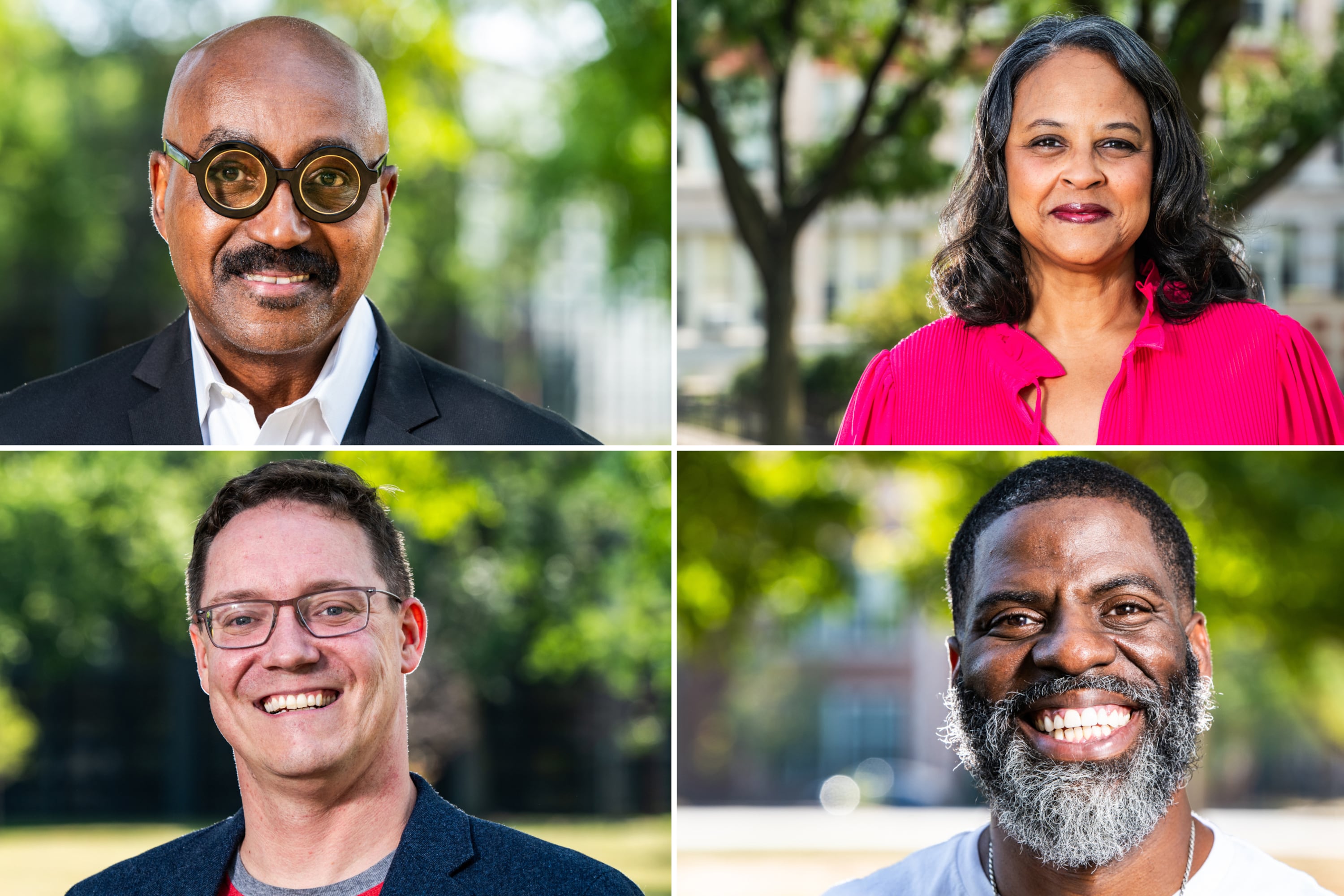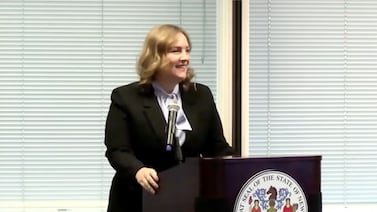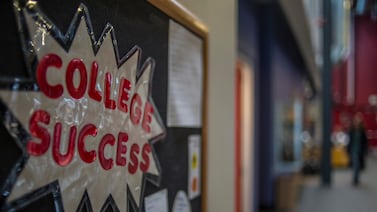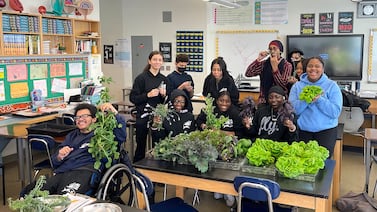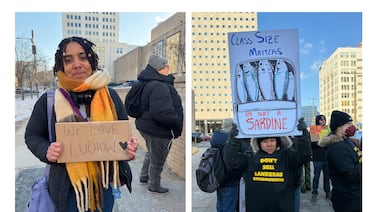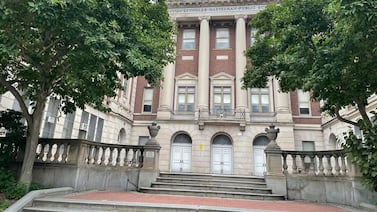Sign up for Chalkbeat Chicago’s free daily newsletter to keep up with the latest education news.
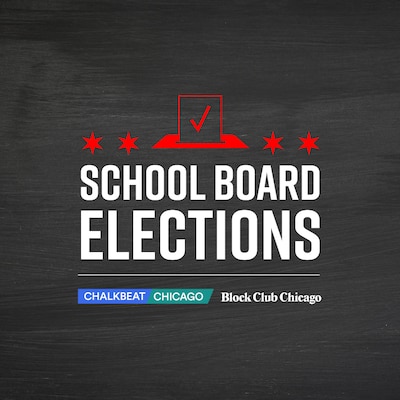
Chicago’s District 10 is one of the city’s largest and most socioeconomically diverse, covering a South Side lakeshore swath stretching from Bronzeville down to South Chicago and the state line between Illinois and Indiana.
The district’s four candidates — Pastor Robert Jones, nonprofit CEO Karin Norington-Reaves, educational consultant Adam Parrott-Sheffer, and artist Che “Rhymefest” Smith — say they want to fix disparities among the roughly 90 Chicago Public Schools-run and charter campuses in the district, which contains both coveted specialized programs and schools that have struggled with shrinking enrollment, safety, and other challenges. A districtwide push to revitalize neighborhood schools resonates in the district.
Almost 80% of the district’s more than 34,700 students are low-income — the second-highest poverty rate among all school board districts. It has among the lowest English learner rates citywide, but has seen a recent influx of migrant students, with schools sometimes struggling to provide bilingual services.
Two District 10 campuses — both selective elementary schools — are in the top 10% of schools across the state in terms of academic performance. There are five schools — two high schools and three elementary schools — in the bottom 5% and deemed in need of “Intensive Support,” according to the Illinois State Board of Education.
As the home of former President Barack Obama, former U.S. education secretary Arne Duncan, and other policymakers, the district is also known as an epicenter of the city’s political elite and a cradle of activism.
As Parrott-Sheffer, put it, “We have that proud independent streak here. We are a place with an informed and active electorate.”
Challenges forced several District 10 candidates off the ballot while two candidates, Jones and Smith, agreed to drop challenges their backers had filed against each other. The district has seen one of the largest campaign contribution hauls so far; the more than $200,000 total includes loans and donations from Smith, his partner, and his music studio to his campaign.
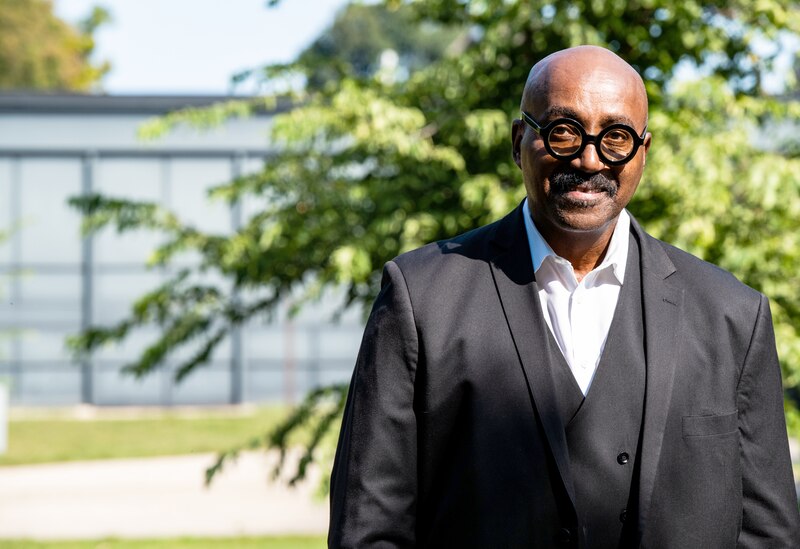
Who is Robert Jones?
Jones, a pastor at Bronzeville’s Mt. Carmel Missionary Baptist Church, says serving on the school board — a time-consuming volunteer role — takes sacrifice. And as someone who went on a 34-day hunger strike to keep Dyett High School open in 2015, he says he has proven he is up for it.
Jones, an elected school board advocate and father of four, is the district’s Chicago Teachers Union-endorsed candidate. A native of East St. Louis, Ilinois., he has also served as a community representative on Dunbar High School’s local school council. He calls the spur-of-the-moment decision to join the hunger strike some credit with saving Dyett a “spiritual moment,” fueled by his outrage at the closure of about 50 South and West Side schools by former Mayor Rahm Emanuel.
“Education has always been near and dear to my heart, especially being in a position to make a difference,” he said.
The board must continue to wrestle with lingering disparities in the student experience in different parts of the city, he said; even Bronzeville itself represents “a tale of two districts.”
Jones is a proponent of Sustainable Community Schools, a district partnership with the CTU in which schools get extra funding to team up with local nonprofits and provide added after-school programs, family engagement, and other services. He sees that program, which Mayor Brandon Johnson has vowed to expand, as key to reviving some of the district’s shrinking campuses.
“Neighborhood schools should be just as important as any other schools,” he said.
As of mid-September, Jones had raised at least $45,000 since launching his campaign. Of that, at least $35,000 came from CTU’s political action committee to pay for field staff and legal fees, according to campaign finance reports filed with the state’s Board of Elections.
Read Jones’ full questionnaire responses.
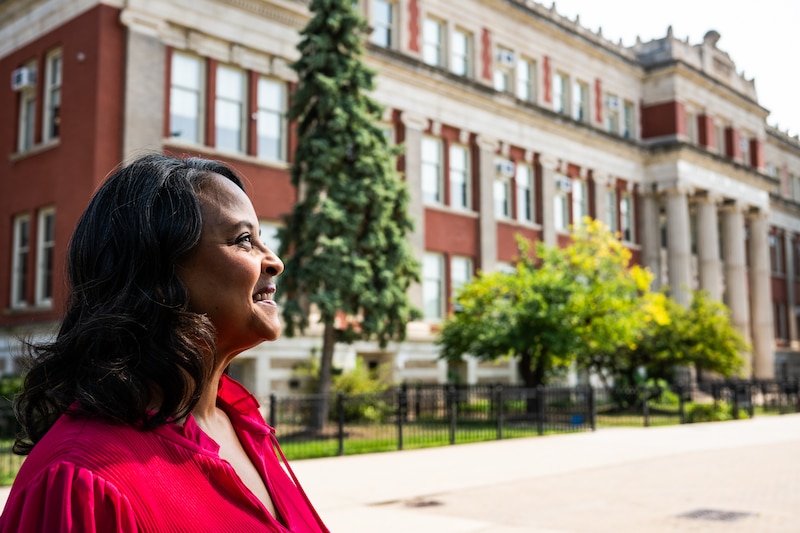
Who is Karin Norington-Reaves?
Norington-Reaves, a nonprofit CEO and former workforce development leader, says her experiences as a former CPS student and the parent of a student with a disability inform her school board bid. As an honors student at Lincoln Park High School, she said she became intensely aware of how “chance and the randomness of a child’s ZIP code” determine student experiences in a segregated city. More recently, she struggled to line up the right support for her daughter, a CPS student who is blind.
“If I found the process overwhelming, what is it like for the average parent who doesn’t have the same tools and resources available to me?” she said. “That question has always haunted me.”
A former candidate for Illinois’ 1st congressional district, Norington-Reaves started her career as a first grade bilingual teacher through Teach for America in California and later led the nonprofit’s chapter in Chicago. She served for more than a decade as the founding CEO of the Chicago Cook Workforce Partnership, an agency created to coordinate efforts to get young people employed. She previously worked as a litigator in the U.S. Department of Justice and in other public sector roles. She recently became the CEO of i.c.stars, a nonprofit that offers technology and leadership training to low-income adults.
Norington-Reaves said she believes the district must expand its career and technical education programs, offering students opportunities to explore possible careers as early as middle school. She said the district must be fiscally responsible and commended the current board for resisting pressure to take on more high-interest debt.
“You can’t just keep kicking the can down the road,” she said. “You’ve got to be looking for efficiencies and economies of scale.”
As of mid-September, Norington-Reaves had raised more than $18,000, according to campaign finance reports filed with the state’s Board of Elections. She received $6,900 from Jim Frank, former CEO of Wheels, Inc. and longtime political donor who also supports the political arm of the education nonprofit Stand for Children.
Norington-Reaves also received $1,500 from the political fund of the New York-based Leadership for Educational Equity, and $1,000 from Phyllis Lockett, CEO of LEAP Innovations, an education technology nonprofit and the former CEO of a now-defunct organization called New Schools for Chicago, which advocated for expanding charters and other new school models during the early 2000s.
Read Norington-Reaves’ full questionnaire responses.
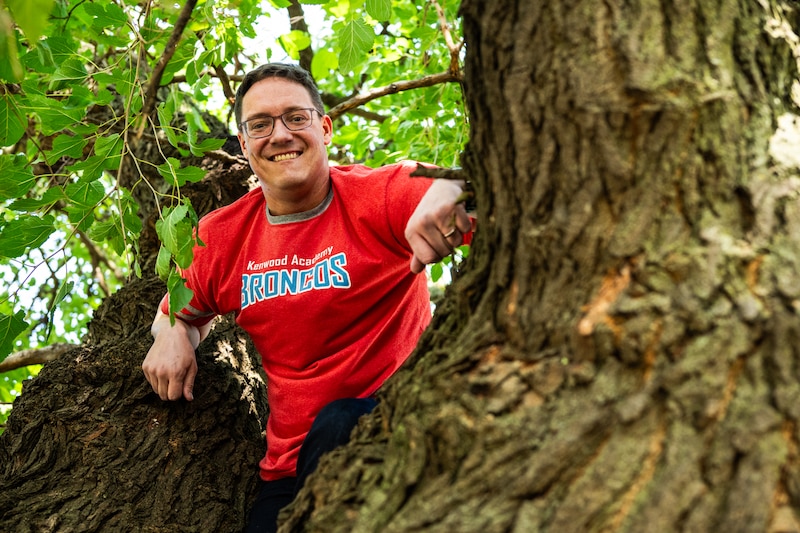
Who is Adam Parrott-Sheffer?
Parrott-Sheffer, an education consultant and former CPS principal, was the first person citywide to declare his school board candidacy. He has billed himself as an independent-minded seasoned educator with “skin in the game” as the father of two students in the district.
Parrott-Sheffer led Mary Gage Peterson Elementary in the early 2010s and now serves as an adjunct lecturer at Harvard University, an author, and a CPS parent volunteer. He’s also a former district administrator in New York City, where he touts his work on a program that helped students with disabilities complete their GEDs. Although his candidacy is not backed by the Chicago Teachers Union, Parrott-Sheffer says he is “the actual pro-teacher candidate” in the race.
He says he brings a sense of urgency to leading the district through precarious financial times while addressing the disparate quality of education, apparent even within parts of District 10.
“You go several blocks and you see that equity isn’t really happening,” Parrott-Sheffer said.
He said he would oppose any effort to oust current CPS CEO Pedro Martinez or take on more district debt, which he said would merely postpone a needed reckoning with CPS’s fiscal pressures. He believes the district must do more to support students with disabilities, English learners, and homeless children.
Parrott-Sheffer said CPS must also start dealing with its aging campuses.
“Many of our buildings are falling apart, and that’s another place where we have kicked the can to future generations,” he said.
As of mid-September, Parrott-Sheffer’s campaign had raised more than $51,000, according to campaign finance reports filed with the state’s Board of Elections, including some contributions from family and friends. He received $1,500 from the political arm of the New York-based Leadership for Educational Equity.
Read Parrott-Sheffer’s full questionnaire responses.
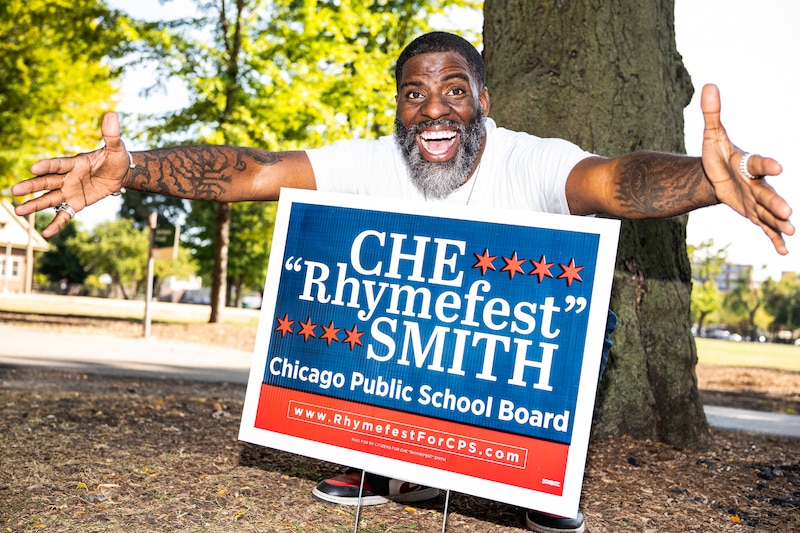
Who is Che ‘Rhymefest’ Smith?
Smith, an award-winning songwriter, rapper, and community activist, says the Chicago school board sorely needs an artist — someone who can not only think creatively about deeply ingrained problems, but can also inspire students and families.
Smith, a South Side native married to a teacher, won a Grammy, Golden Globe, and Academy Award for a song he created with Common and John Legend for the 2014 movie “Selma.” But on the campaign trail, he has touted his work as a youth mentor and the co-founder of the youth outreach nonprofit Art of Culture. Smith, who previously ran for alderman of the 20th Ward, said his Pritzker Fellowship at the University of Chicago last fall was key in spurring him to think deeply about education and pursue the school board position.
He has garnered endorsements from elected officials, including Illinois Secretary of State Alexi Giannoulias and a number of state lawmakers, county commissioners, and aldermen.
He said his priorities on the board would be providing more mental health and anti-bullying support to students and boosting arts and STEM programs, including through partnerships with local higher education institutions, museums, and others. He sees these efforts as key to propping up neighborhood schools, holding up South Shore High School as a model.
“A school can turn around, and a neighborhood can turn around with it,” he said.
He also said he would like the district to step up efforts to listen and involve residents — especially young people — in decision-making. To weather looming deficits, the district needs to attack waste, he said, pointing to failure to track some tablets and laptops bought during the pandemic.
“A $10 billion budget — and the taxpayers keep getting squeezed for more money,” he said.
Smith is primarily self-funding his bid for a school board seat. As of Sept. 22, he had loaned his campaign nearly $95,000. In all, his fund had brought in almost $108,000, according to campaign finance reports filed with the state’s Board of Elections. He received $1,000 from Peggy Montes, founder of the Bronzeville Children’s Museum, and got $1,000 from the political fund of 40th Ward Ald. Andre Vasquez, who was also a rapper before entering politics.
Read Smith’s full questionnaire responses.
Who is Rosita Chatonda (write-in candidate)?
Rosita Chatonda is a former longtime CPS teacher and Chicago Teachers Union organizer who says she entered the board race because she wants to hold both the district and the union more accountable. An elected school board advocate, she is running as a write-in candidate after challenges to her ballot signatures knocked her off the November ballot.
“The people who fought for an elected school board should have a chance to be on the ballot,” she said.
Chatonda, who taught middle school math and science, is also the founder of a couple of education-related nonprofits. Through one of them, the Chicago Alliance of Urban School Educators, she and other teachers are suing the district for wrongful termination. She said that despite her previous work with the CTU, she did not seek its endorsement. She argues that the union’s political activism is detracting from its role advocating for educators; she also disagrees with some of its stances, such as opposition to standardized testing, which she says is important in guiding classroom instruction and parental involvement.
As a candidate and the grandmother of a CPS student and three recent district graduates, Chatonda says she is concerned about the literacy gap and other disparities facing Black and low-income students in the district. She says more of the support available to English learners in Chicago and elsewhere should extend to other vulnerable students.
Chatonda also said she thinks the school board needs to scrutinize district spending more and ask tough questions about the financial challenges it faces.
“We get much more money for fewer students,” she said. “I don’t understand where the deficit comes in.”
Chatonda did not submit a questionnaire.
Mila Koumpilova is Chalkbeat Chicago’s senior reporter covering Chicago Public Schools. Contact Mila at mkoumpilova@chalkbeat.org.
This story was published in partnership with Block Club Chicago.

